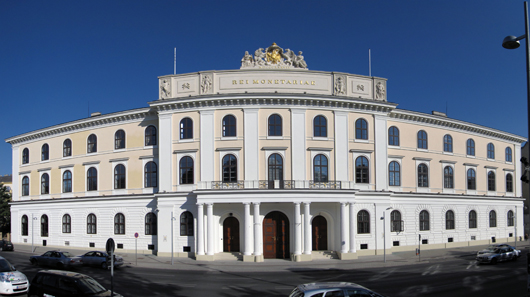A new income tax law came into effect in Austria on 25 October 1896, creating a new personal income tax, which was to be withheld from all wages and salaries. The purpose of the new tax was not to increase government revenue, but to allow land tax, commercial tax and building tax to be reduced. The Socialist Party above all fought against the injustice of this redistribution and organised frequent protest events, which also included employees of state-owned enterprises.
The Austrian Hauptmünzamt. Photo: Gryffindor / Wikipedia.
The party found fertile grounds for its ideas, as employees of state enterprises were far from satisfied with their conditions. Evidence of this dissatisfaction was provided by employees of the Austrian Imperial Mint who, on 9 July 1898 (“in the year of misery”), wrote a letter, inserted it into an empty beer bottle, and then bricked up the bottle inside a wall. The letter, which expresses their anger and strong sense of injustice and hopelessness, was only found in 1967, when a much later generation of mint employees demolished a coke smelting furnace.
The letter lists the wages of each employee and compares them with their expenses, concluding that “there is general dissatisfaction. Rents are high, food is expensive. We all lead thoroughly miserable lives.” This was the year of the Emperor’s anniversary, which was celebrated with great ostentation throughout the empire, but the workers could not have cared less: “It is the Emperor’s 50th anniversary on the throne, and Vienna is celebrating the occasion. There is pomp and pageantry everywhere, but many of us at the Imperial Mint have been sacked, even after having worked here for 5, 6 or 7 years. So the anniversary is no reason for us to be joyous. Today is Saturday, and, having just paid our debts, we are as poor as we were yesterday. … We hope that you, who discover this letter, will fare better than we do now.”
And indeed Austrians did fare much better in 1967, when the letter was found. The then employees of the mint decided to write their own message in a bottle, which they added to the one written almost seven decades earlier, but on this occasion they emphasised their satisfaction with their conditions. They also listed their wages, and added how pleased they were with regular holidays and the fact that both rents and food were very cheap. “We are still enjoying the post-WWII boom. Private earnings are higher. There is an atmosphere of satisfaction and prosperity all around.”
This satisfaction is expressed in each and every line of the letter, and hopes extended even further. The mint employees expected that things would get better still, and they ended their letter to future generations with the words, “may all this be useful for you to know, and may you enjoy a period that is even better than ours.”
And are our lives better? One thing is certain: we cannot but envy the authors of the 1967 letter for their profound optimism.






